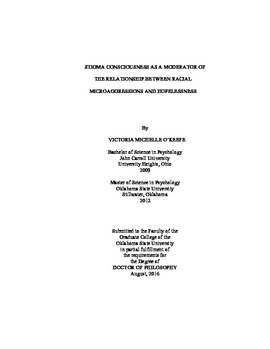| dc.description.abstract | Given the continual change in the United States demography and an increase in racial and ethnic minority populations, issues relevant to these groups are necessary to address (e.g., discrimination). Whereas overt discrimination was common in the mid-20th century, contemporary discrimination currently appears to be prevalent and problematic. Contemporary discrimination can be distinguished from its overt counterpart in that it is subtle, at times even unnoticeable by the perpetrator(s) or victim(s). One specific form of contemporary discrimination is termed "racial microaggressions". Microaggressions are described as daily encounters in which racial minority group members are subject to prejudicial messages aimed at them by individuals or the environment. Past research has linked racial microaggression experiences with depression and anxiety symptoms, perceived stress, and substance use, among other negative health outcomes. However, research has not investigated the relationship between racial microaggressions and hopelessness, which is often a precursor to depression and other mental health correlates. In addition, research has not differentiated individual experiences of awareness of being victim to racial microaggressions. One measure of individual differences in awareness and anticipation that others will stereotype one is through stigma consciousness. Similar to racial microaggressions, high levels of stigma consciousness have been related to lower levels of belonging and poorer academic performance. Therefore, the current study aimed to examine the relationships between the constructs of racial microaggressions, hopelessness, and stigma consciousness in a group of 183 African American/Black, Hispanic/Latino(a), Native American, and Asian/Asian American students. Results yielded a strong association between racial microaggressions and stigma consciousness, as well as hopelessness with racial microaggressions, and stigma consciousness. However, the hypothesized relationship of stigma consciousness as a moderator of the relationship between racial microaggressions and hopelessness was not supported. Post hoc analyses indicated significant differences in experiences of racial microaggressions, stigma consciousness, and hopelessness. Future research should continue to investigate these constructs, particularly separately by racial or ethnic group. This study is an important contribution to the growing quantitative literature on sociocultural experiences (i.e., racial microaggressions and stigma consciousness) impacting health outcomes in people of color. Societal and clinical implications are discussed. | |
